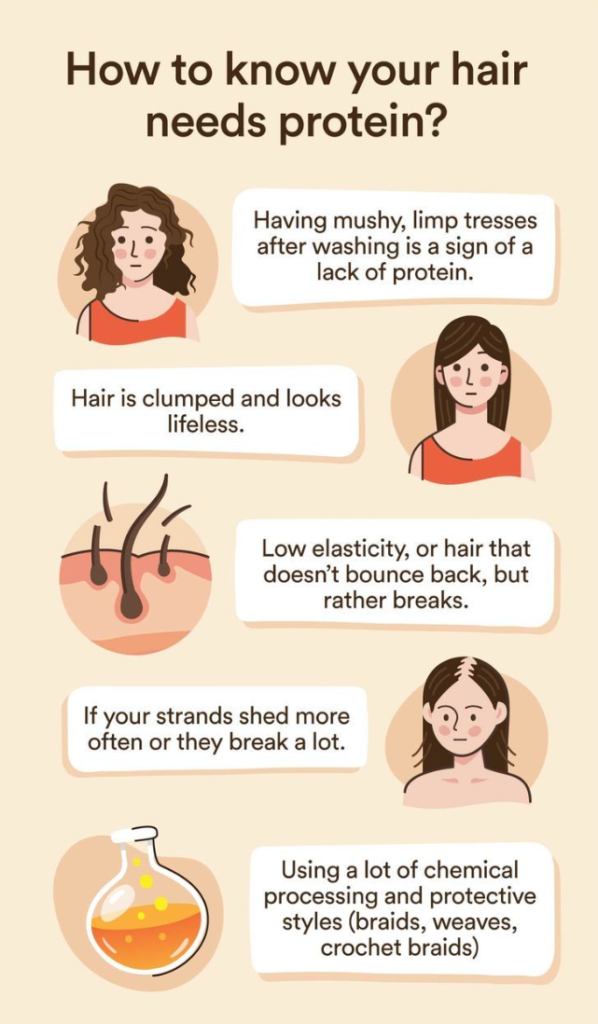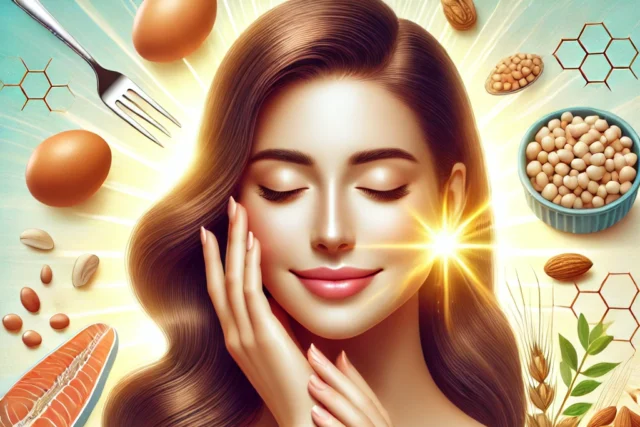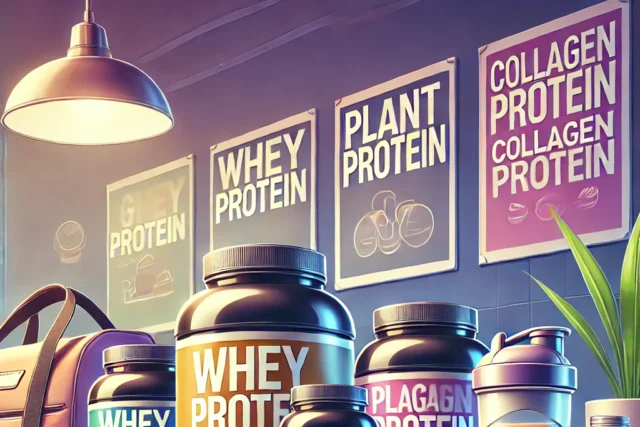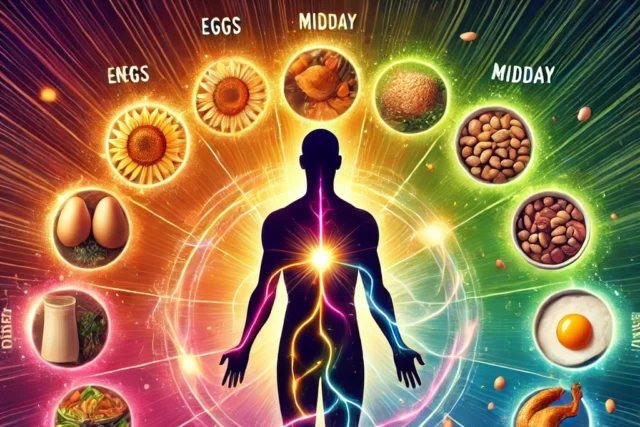Introduction
Your skin, hair, and nails are more than just a reflection of beauty—they are indicators of your overall health. Maintaining their vibrancy, strength, and resilience starts from within, and proteins play a crucial role in this process. From glowing skin to shiny hair and robust nails, protein is a powerhouse nutrient that deserves your attention. Let’s dive into how protein supports your beauty goals and why it should be a staple in your diet.
Table of Contents
Understanding Protein and Its Functions
What Is Protein?
Protein is a macronutrient essential for life, composed of building blocks called amino acids. These amino acids form the foundation of tissues, organs, enzymes, and hormones. Without protein, your body wouldn’t have the structural integrity or functional efficiency to thrive.
There are two types of amino acids: essential (those you must obtain from food) and non-essential (those your body can produce). Together, they help maintain bodily functions, including skin elasticity, hair growth, and nail strength.

How Protein Supports Body Functions
Proteins act as the body’s repair crew. It rebuilds damaged cells, supports muscle and tissue development, and maintains your body’s structural framework. Key proteins like collagen, elastin, and keratin are directly involved in maintaining healthy skin, hair, and nails.
Proteins and Healthy Skin
Role of Protein in Skin Health
Collagen, the most abundant protein in the body, is the backbone of skin health. It provides elasticity, preventing sagging and reducing the appearance of wrinkles. Proteins also assist in repairing damaged skin cells and forming new ones, ensuring your skin stays radiant and youthful.
Benefits of Collagen-Rich Foods
Collagen-rich foods like bone broth, fish, eggs, and leafy greens can work wonders for your skin. Consuming these foods helps replenish collagen stores, boosting your skin’s firmness and glow.
Proteins Deficiency and Its Effects on Skin
When your diet lacks protein, your skin shows it. Signs include dryness, premature wrinkles, and slow wound healing. Ensuring sufficient protein intake can help you avoid these issues and maintain a supple, hydrated complexion.
Protein’s Impact on Hair

How Proteins Support Hair Growth
Your hair is made primarily of keratin, a fibrous protein that gives it strength and structure. A diet rich in protein supports the production of keratin, ensuring your hair grows stronger, longer, and shinier. Protein also plays a role in the anagen phase (growth stage) of the hair cycle.
Signs of Proteins Deficiency in Hair
Are your strands brittle, thinning, or prone to split ends? These are classic signs of protein deficiency. Without adequate protein, your hair struggles to maintain its structure, leading to dullness and breakage.
Best Sources of Proteins for Hair Health
- Animal-based: Eggs, chicken, fish, and dairy.
- Plant-based: Lentils, quinoa, chia seeds, and soy products.
These foods provide the amino acids your hair follicles need to thrive.
Protein and Nail Health

The Connection Between Protein and Nails
Just like hair, nails are primarily composed of keratin. Consuming enough protein ensures your nails grow strong, smooth, and resilient.
Protein Deficiency and Nail Problems
Weak, brittle nails that chip or peel easily are often a sign of insufficient protein intake. Severe deficiencies can even cause ridges or discoloration in your nails.
Enhancing Nail Health With Protein
Adding lean meats, beans, and nuts to your diet is an excellent way to support nail growth. Supplements like collagen or biotin may also enhance results.
Daily Protein Requirements for Optimal Beauty

How Much Protein Do You Need?
The recommended daily allowance (RDA) for protein is about 46 grams for women and 56 grams for men, though these numbers can vary based on activity level and age.
Adjusting Protein Intake for Specific Goals
If glowing skin, luscious hair, and strong nails are your goals, consider increasing your protein intake by 10–20%. Consult a nutritionist for personalized guidance.
Signs You’re Not Getting Enough Protein
Fatigue, muscle loss, and slow wound healing are common symptoms of protein deficiency. If you notice changes in your skin, hair, or nails, it might be time to reevaluate your diet.
Combining Protein With Other Nutrients for Beauty
Synergy Between Protein and Vitamins
Protein works in tandem with essential vitamins like vitamin C, E, and biotin to elevate your skin, hair, and nail health. Vitamin C is a key player in collagen synthesis, ensuring your skin remains firm and youthful. Meanwhile, vitamin E acts as an antioxidant, protecting skin and hair cells from oxidative stress caused by environmental damage. Biotin, a B vitamin, is often dubbed the “beauty vitamin” because it enhances keratin production, leading to stronger hair and nails.
To maximize these benefits, pair protein-rich foods like eggs and fish with vitamin-rich options such as citrus fruits, nuts, and leafy greens. This combination supports your body’s ability to repair tissues and boost overall beauty.

Protein and Hydration
Hydration and protein go hand in hand in maintaining radiant skin. Water aids in protein metabolism, helping your body process and utilize amino acids effectively. On the flip side, proteins like collagen support water retention in skin tissues, keeping your skin plump and hydrated.
Drinking plenty of water alongside consuming protein-rich meals is crucial. For example, a hydration-packed smoothie with whey protein, spinach, and cucumber can be a powerful beauty booster. Hydrated skin reflects light better, giving you that natural glow.
Healthy Fats and Protein
Omega-3 fatty acids, found in foods like salmon, flaxseeds, and walnuts, complement protein’s effects by reducing inflammation and supporting skin elasticity. Healthy fats also aid in the absorption of fat-soluble vitamins (A, D, E, and K), which are critical for maintaining strong hair and nails.
Combining protein with healthy fats—such as pairing grilled chicken with avocado or sprinkling chia seeds over Greek yogurt—provides a holistic approach to achieving luminous skin, luscious locks, and sturdy nails.
Lifestyle Tips for Maximizing Protein Benefits

Best Times to Consume Protein
When you consume protein matters as much as how much you consume. Starting your day with a protein-packed breakfast like eggs or a protein smoothie can fuel your body and kickstart tissue repair. Spreading protein intake evenly throughout the day ensures that your body consistently receives the amino acids it needs for maintenance and growth.
Pre- and post-workout protein consumption is particularly effective for those focusing on beauty and fitness. Protein after exercise aids in recovery, promoting glowing skin and healthy hair growth.
Balanced Diet and Exercise
A well-balanced diet and regular exercise amplify protein’s impact on your beauty. A diverse diet that includes lean meats, fish, legumes, and colorful fruits and vegetables ensures you get all the necessary nutrients. Exercise improves circulation, delivering protein and other nutrients more efficiently to your skin, hair, and nails.
Cardio activities boost blood flow, while strength training helps your body utilize dietary protein for tissue repair and muscle building. Together, these habits create a strong foundation for beauty from within.
Avoiding Harmful Habits
Certain lifestyle habits can sabotage the benefits of a protein-rich diet. Smoking, for instance, damages collagen and reduces skin elasticity. Chronic stress leads to hair thinning and brittle nails, while a poor diet filled with sugar and processed foods competes with protein for metabolic attention.
Eliminating these harmful habits while maintaining a nutrient-rich diet enhances the benefits of protein. Simple changes, such as quitting smoking, managing stress through mindfulness, and avoiding junk food, can make a world of difference in your beauty routine.
Conclusion
Protein is a beauty essential, supporting healthy skin, shiny hair, and resilient nails. Its role in collagen synthesis, keratin production, and cell repair underscores its importance in your diet. By combining protein with vitamins, hydration, and healthy fats, you can maximize its benefits. Adopting a balanced lifestyle further ensures that your protein intake translates into visible, lasting results.
Incorporate more protein-rich foods like lean meats, fish, beans, nuts, and seeds into your meals today. With consistent effort, you’ll not only look your best but also feel healthier and more confident.
Frequently Asked Questions
1. What are the best protein sources for beauty?
The best protein sources for skin, hair, and nails include lean meats, fish, eggs, legumes, nuts, seeds, and dairy products. Plant-based options like quinoa and tofu are also excellent choices.
2. Can too much protein harm your skin, hair, or nails?
While protein is essential, excessive intake can strain the kidneys and potentially lead to dehydration, which negatively affects skin and hair. Stick to recommended daily intakes and balance your diet.
3. How long does it take to see results from a protein-rich diet?
Visible improvements in skin, hair, and nails can take 6–8 weeks of consistent protein intake. However, internal repair begins almost immediately.
4. Is plant-based protein as effective as animal-based protein for skin and hair?
Yes, plant-based proteins can be just as effective when consumed in sufficient amounts. Combining different plant proteins ensures you get all essential amino acids.
5. Do protein supplements improve beauty faster than natural foods?
Supplements can help meet protein needs but shouldn’t replace whole foods. Natural sources also provide additional vitamins, minerals, and antioxidants that enhance overall beauty.



MOST COMMENTED
Animal-Based Proteins / Casein Protein / Dietary Protein / High-Protein Diets / Pea Protein / Plant-Based Proteins / Protein / Protein Deficiency / Protein Supplements / Proteins / Whey Protein / Whey Proteins
Pea Proteins: The Best Plant-Based Protein Alternative?
Foot Problem / Foot Health
Revolutionize Your Recovery: Natural Remedies for Plantar Fasciitis – Fresh Home Keepers
Dietary Supplement
Revitalize Your Health: The Magic of Red Yeast Rice Capsules
Exercises and Footwear Tips for Hammertoe Relief / Foot care / Foot Health / Foot Pain / Foot Problem / Hammertoes
Unlock Effective Exercises and Footwear Tips for Hammertoe Relief
Hammertoes / Foot Health / Foot Pain / Foot Problem
Unlock Relief: Essential Guide to Hammertoes Causes, Symptoms, and Treatments
Moringa Powder / Moringa Supplement
Green Superfood: The Ultimate Guide to Moringa Leaf Powder
Moringa Powder
Supercharge Your Diet: The Incredible Impact of Moringa Leaf Powder
Animal-Based Proteins / Casein Protein / Dietary Protein / High-Protein Diets / Pea Protein / Plant-Based Proteins / Protein / Protein Deficiency / Protein Supplements / Proteins / Whey Protein / Whey Proteins
Is Protein Powder Safe for Teenagers and Children?
Animal-Based Proteins / Casein Protein / Dietary Protein / High-Protein Diets / Pea Protein / Plant-Based Proteins / Protein / Protein Deficiency / Protein Supplements / Proteins / Whey Protein / Whey Proteins
Unlock the Power of Proteins for Optimal Gut Health
Shin Splints / Foot Health / Foot Problem
Unlock Relief: Essential Guide to Overcoming Shin Splints – Discover Healing Strategies